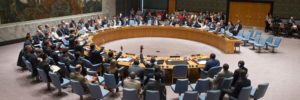Security Council Subsidiary Bodies
The United Nations Charter announced by the Article 29 they have sets out the Security Council may establish subsidiary bodies as needed for the performance of its functions. This is also reflected in Rule 28 of the Council’s Provisional Rules of Procedure.
All existing committees and working groups are comprised of the fifteen members of the Council. While standing committees are chaired by the President of the Council, rotating on a monthly basis, other committees and working groups are chaired or co-chaired by designated members of the Council who are announced on an annual basis by a Note of the President of the Security Council.
The mandate of subsidiary organs, whether they are committees or working groups, can range from procedural matters (e.g. documentation and procedures, meetings away from headquarters) to substantive issues (e.g. sanctions regimes, counter-terrorism, peacekeeping operations) told by press releases.
The International Criminal Tribunal for the former Yugoslavia (ICTY) and the International Criminal Tribunal for Rwanda (ICTR) are subsidiary organs of the Security Council within the terms of article 29 of the Charter. As such they are dependent on the UN in administrative and financial matters, although as judicial institutions, they are independent of any one State or group of States, including their parent body, the Security Council.

Committees and Counter-Terrorism Committee is guided by Security Council resolutions 1373 (2001) and 1624 (2005), the CTC works to bolster the ability of United Nations Member States to prevent terrorist acts both within their borders and across regions. It was established in the wake of the 11 September terrorist attacks in the United States.
The CTC is assisted by the Counter-Terrorism Committee Executive Directorate (CTED), which carries out the policy decisions of the Committee, conducts expert assessments of each Member State, and facilitates counter-terrorism technical assistance to countries.
The Military Staff Committee helps plan UN military measures and regulate armaments. Sanctions Committe are in use of mandatory sanctions is intended to apply pressure on a State or entity to comply with the objectives set by the Security Council without resorting to the use of force. Sanctions thus offer the Security Council an important instrument to enforce its decisions. The universal character of the United Nations makes it an especially appropriate body to establish and monitor such measures.
The Council has resorted to mandatory sanctions as an enforcement tool when peace has been threatened and diplomatic efforts have failed. The range of sanctions has included comprehensive economic and trade sanctions and/or more targeted measures such as arms embargoes, travel bans, financial or diplomatic restrictions.
Standing Committees and Ad Hoc Bodies are open-ended and generally were established to address certain procedural questions, such as the admission of new members. Ad hoc committees are established for a limited time and to address a specific issue.
Peacekeeping Operations and Political Missions of military, police and civilian personnel, who work to deliver security, political and early peacebuilding support. Peacekeeping is flexible and over the past two decades has been deployed in many configurations. Today’s multidimensional peacekeeping operations are called upon not only to maintain peace and security, but also to facilitate the political process, protect civilians, assist in the disarmament, demobilization and reintegration of former combatants; support the organization of elections, protect and promote human rights and assist in restoring the rule of law.
Political missions are part of a continuum of UN peace operations working in different stages of the conflict cycle. In some instances, following the signing of peace agreements, political missions overseen by the Department of Political Affairs during the stage of peace negotiations have been replaced by peacekeeping missions. In other instances, UN peacekeeping operations have given way to special political missions overseeing longer term peace-building activities.
International Courts and Tribunals Advisory Body are in the Peacebuilding Commission (PBC) is an intergovernmental advisory body that supports peace efforts in countries emerging from conflict, and is a key addition to the capacity of the International Community in the broad peace agenda.
The Peacebuilding Commission plays a unique role in: bringing together all of the relevant actors, including international donors, the international financial institutions, national governments, troop contributing countries; marshalling resources and advising on and proposing integrated strategies for post-conflict peacebuilding and recovery and where appropriate, highlighting any gaps that threaten to undermine peace.
The Peacebuilding Commission is an Advisory Subsidiary Body of both the Security Council and the General Assembly.


